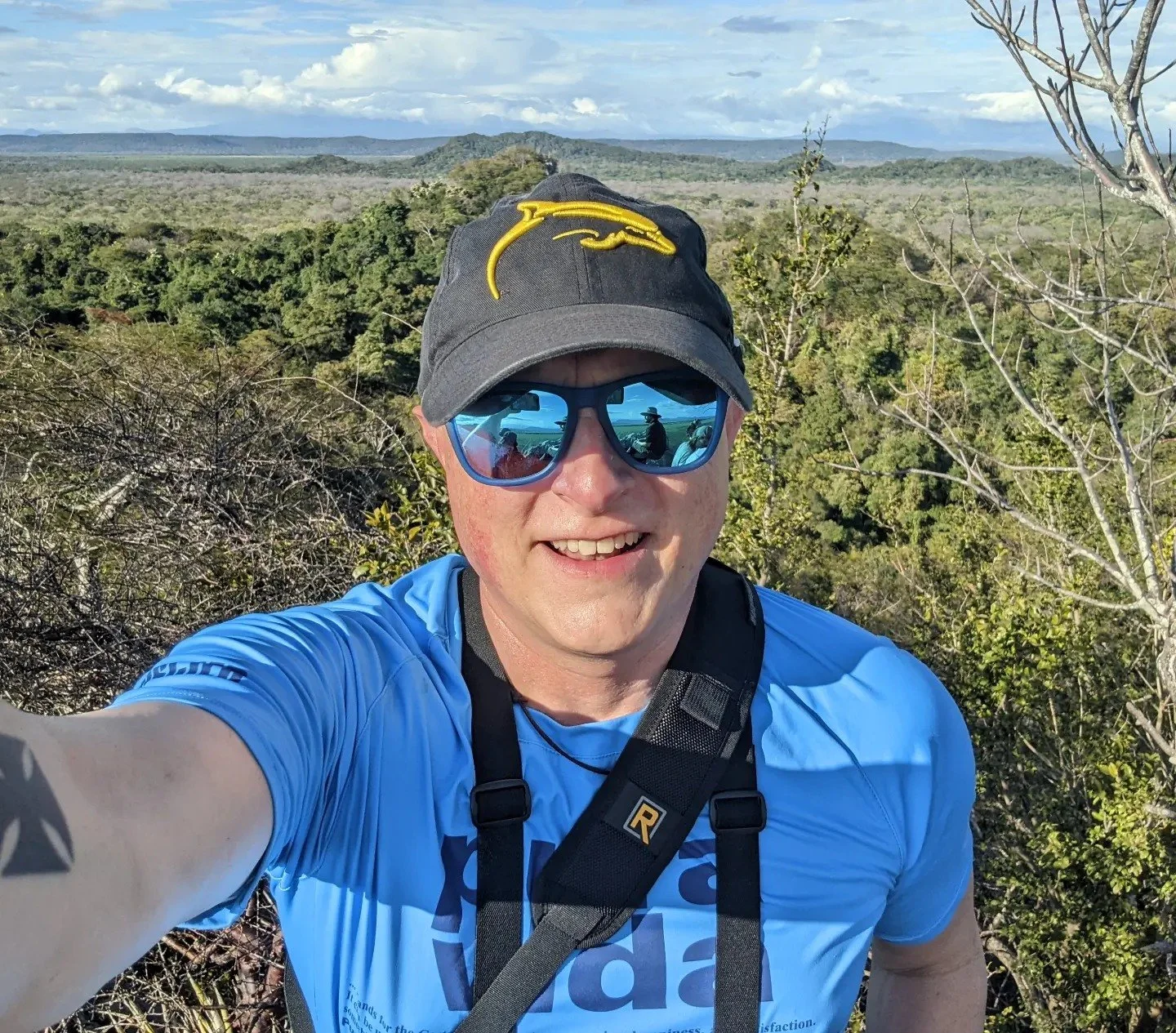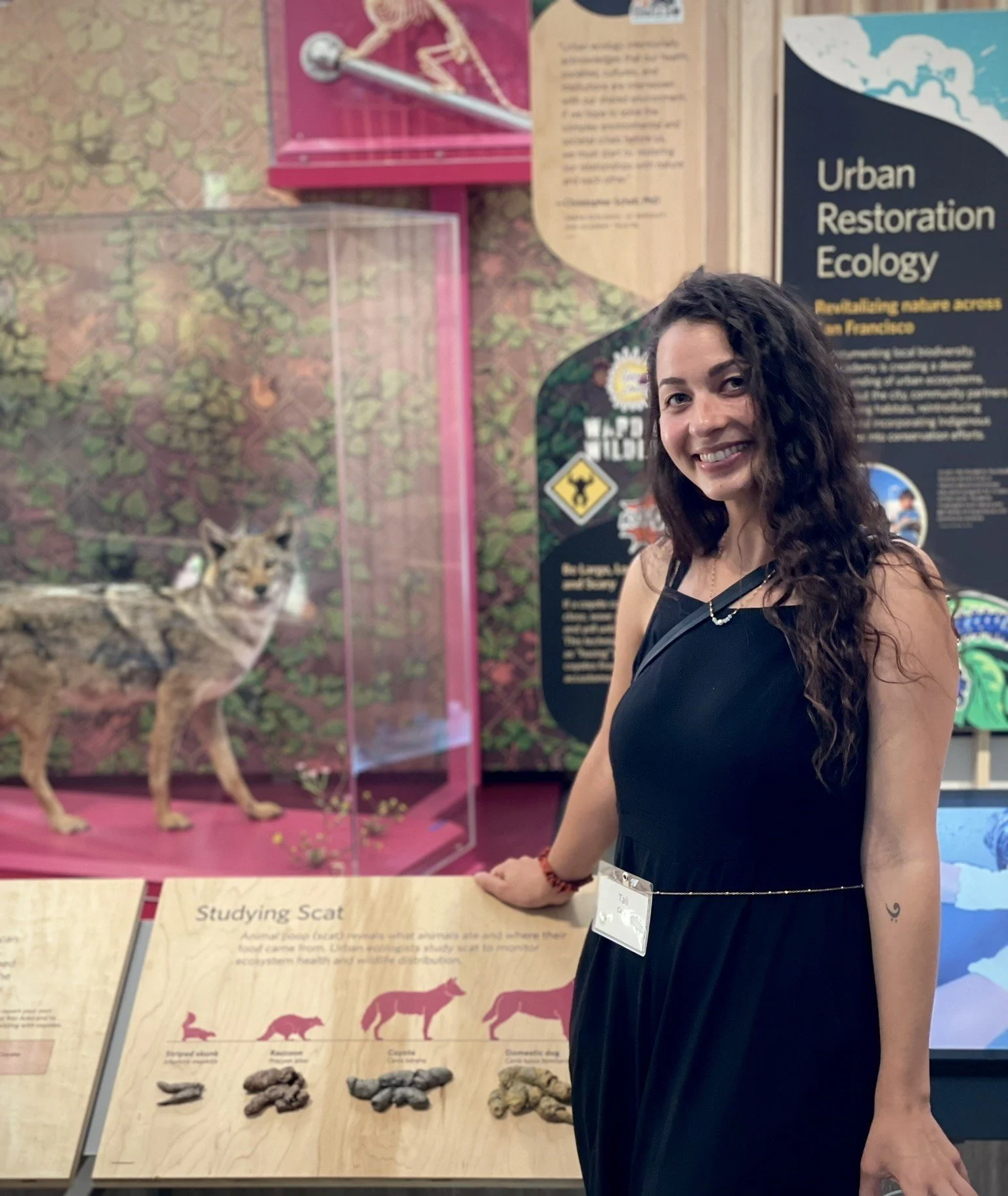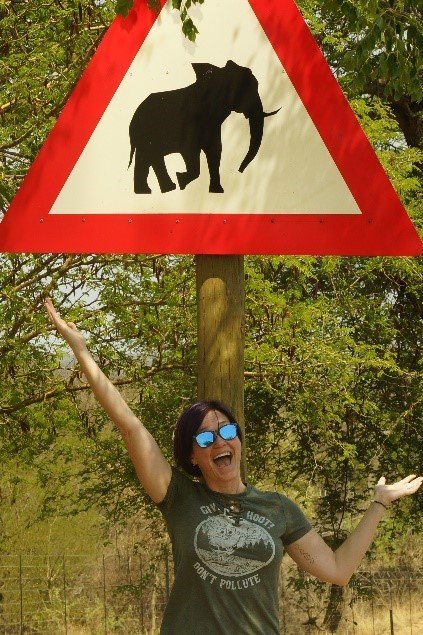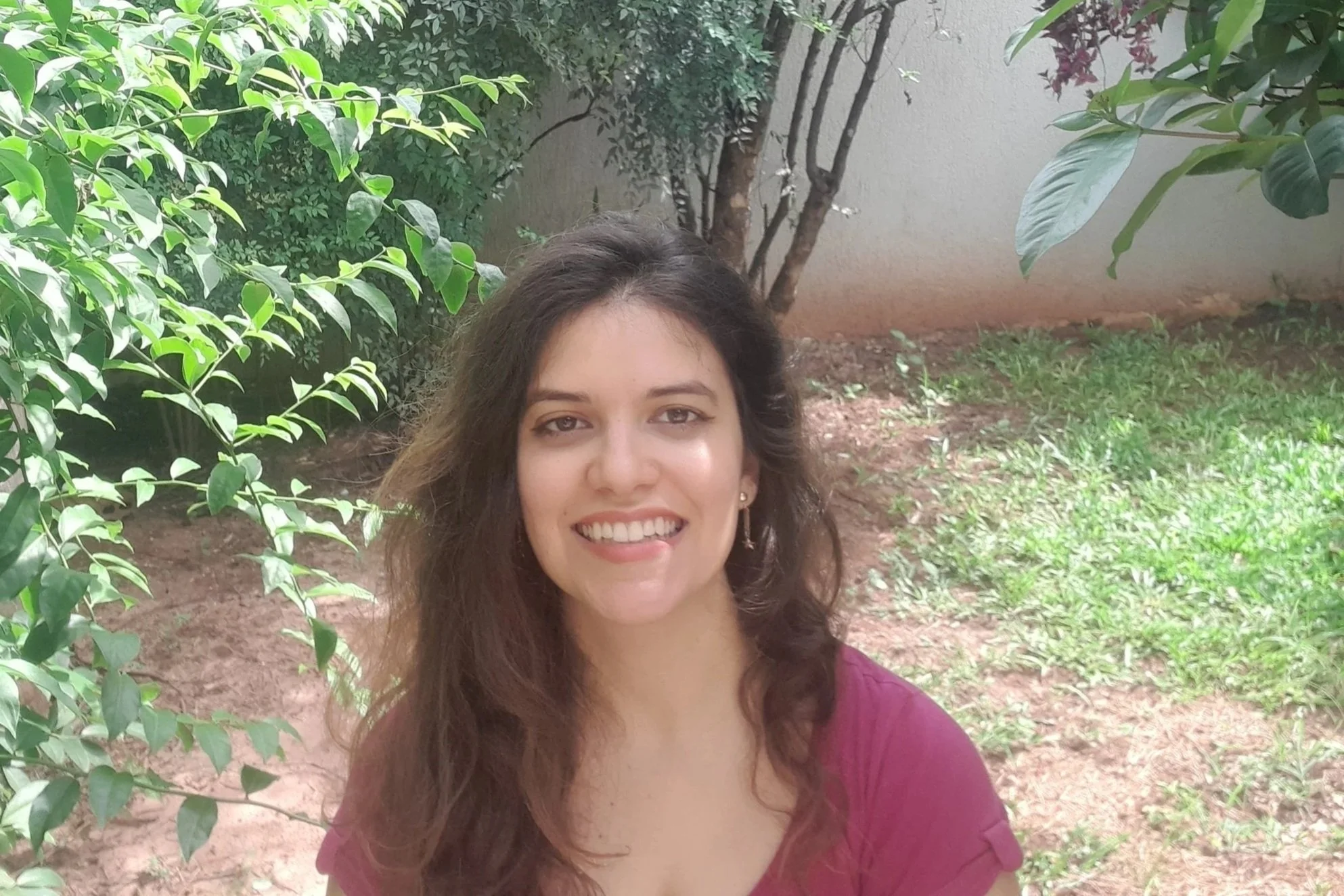THE EXECUTIVE BOARD
Jason Luscier, Chair
Le Moyne College (lusciejd@lemoyne.edu)
Jason Luscier (he/him) is a Professor of Biological and Environmental Sciences at Le Moyne College in Syracuse, NY. He leads an undergraduate urban wildlife research lab that studies the ecology of Syracuse, focusing on topics such as artificial light at night, noise pollution, the luxury effect, free-roaming domestic cats, and wildlife disease. Many of his students continue on to graduate programs in urban ecology. He developed CatTracker, a smartphone app that collects community science data on domestic cat sightings. He also conducts research on urban bird populations and communities in Cork City, Ireland—one of the fastest-growing urban areas in the European Union. His overarching goal is to inform urban planning decisions that support and enhance biodiversity in cities. He is especially committed to expanding equitable and safe access to meaningful wildlife-viewing opportunities for all people. Jason also serves as an Associate Editor for the journal Urban Ecosystems.
Jessica Alderson, Chair-Elect
Texas Parks and Wildlife Department (Jessica.Alderson@tpwd.texas.gov)
Jessica Alderson received her Bachelor’s and Master’s degrees in Wildlife and Fisheries Sciences from Texas A&M University. Her Master’s research focus was on the human dimensions of urban wildlife management, specifically white-tailed deer. In 2008, Jessica began working as an Urban Biologist for Texas Parks and Wildlife in the Dallas-Fort Worth metroplex. In 2012 she transferred to the Urban Office in San Antonio. As an Urban Biologist, Jessica performed professional planning, management, research, conflict resolution and public outreach associated with wildlife, habitat and natural resource management in urban areas. In 2023, Jessica became the Urban Wildlife Technical Guidance Program Leader, which supervises the TPWD urban biologists across the state.
Grace Kahler, Treasurer-Secretary
Humane World for Animals (gkahler@humaneworld.org)
Grace Kahler is the Program Researcher for the Urban Wildlife team at Humane World for Animals, where they support research and implementation of humane, effective strategies to manage human-wildlife conflicts. With over a decade of experience, Grace brings a diverse background in wild animal husbandry, behavior management, research design, and the coordination of field-based wildlife fertility control projects. Their current work focuses on building capacity for evidence-based, equitable, and sustainable approaches to resolving wildlife conflicts in urban environments. This includes developing research to assess practical, community-centered frameworks and tools that promote coexistence between people and wildlife. Grace is known for their upbeat demeanor, strong communication and active listening skills, and a continuous commitment to learning and professional growth. They hold a bachelor’s degree in Psychology from the University of Maryland, Baltimore County, and a master’s in Wildlife Ecology and Conservation from the University of Florida. Grace is a board-certified American Board of Forensic Entomology Technician and is certified in Ivory and Feather Identification through the Society for Wildlife Forensic Science. Currently based in western North Carolina, Grace has lived across the United States, including Maryland, Texas, and Arizona, accompanied by a few now-senior rescue animals.
Sarah Grimké Aucoin, Past Chair
NYC Parks & Recreation (sarah.aucoin@parks.nyc.gov)
Sarah Grimké Aucoin currently serves as the Chief of Education & Wildlife for NYC Parks. Sarah’s tenure in NYC Parks spans twenty five years of innovation and programmatic expansion in the areas of environmental education, outdoor adventure, active conservation and wildlife management. As Chief of Education & Wildlife, Sarah oversees the Urban Park Rangers, Teaching & Learning Support, and the Wildlife Unit, whose mission is to promote coexistence between people and urban wildlife in New York city. As an informed resource for citizens and policymakers, the Wildlife Unit serves as an ambassador for New York City's diverse wildlife communities and seeks to create a future where wildlife is a familiar, understood, and indispensable part of New York City's urban landscape. Sarah has a rich and accomplished academic background that includes a Bachelor of Arts degree in Biology from the University of California – Santa Cruz, and a Master of Science degree in Ecology from the University of Louisiana. She is an accomplished writer and researcher, having written and published a number of peer-reviewed monographs on subjects including the behavior of larval amphibians, the philosophy of declining amphibian populations, and the sexual bias in studies of animal behavior. Sarah has been a member of The Wildlife Society and the Urban Wildlife Working Group since 2015, and a board member of the Urban Wildlife Working Group since 2018.
MEMBERS
Travis Gallo, TWS Conference Coordinator
University of Maryland (tgallo@umd.edu)
Travis Gallo is an Assistant Professor in the Department of Environmental Science and Technology at the University of Maryland. Travis’s research team focuses on understanding how urban environments shape species distributions, populations, communities, and behaviors with a central focus on species conservation and equitable and safe access to nature. The goal of his research team is to provide evidence-based solutions that simultaneously conserve biological diversity and improve the lives of urban residents. Current projects in Travis’s lab are a large-scale camera trap project in the Washington, D.C. region (collaboration with the Urban Wildlife Information Network - UWIN), a deer-human interaction project with an eye towards zoonotic disease transmission, assessing conservation incentive programs in Tanzania, and various D.C. specific projects. Prior to working in the D.C. region, Travis was a postdoctoral researcher at the Urban Wildlife Institute at the Lincoln Park Zoo where he worked on a variety of research questions associated with the Chicago UWIN site. Travis is an Associate Editor for Urban Ecosystems and has been a member of the Urban Wildlife Working Group since 2016. Travis was also the local co-host for the 2023 International Urban Wildlife Conference in Washington, D.C.
Leslie Bliss-Ketchum, Registrar
Samara Group LLC (leslie@samarapdx.com)
Leslie Bliss-Ketchum is a wildlife ecologist who has been actively monitoring and researching the impacts of the built environment on habitat connectivity, assessing the success of mitigation efforts and developing habitat connectivity assessments as well as developing flexible and functional urban biodiversity monitoring frameworks. She is currently serving as registrar with the Urban Wildlife Working Group as Secretary Treasurer, after serving as a board member. She is a Past-President of the Oregon Chapter of The Wildlife Society and former Conservation Affairs Representative for the Northwest Section of TWS. Leslie is the owner and director of an environmental consulting firm, Samara Group that was founded to enhance environmental projects centered on rigorous science, inclusive partnerships, and effective communications. Leslie received her Ph.D. in Environmental Science from Portland State University where her research focused primarily on the mechanisms that contribute to roads becoming barriers to wildlife movement and measuring wildlife response to mitigation efforts. She is excited to be continuing this work on a variety of scales, from region to neighborhood, to statewide and beyond. She received her Bachelor of Science in Environmental Science with a minor in Biology and graduated Cum Laude from PSU and is an adjunct faculty member at Portland State University teaching courses in field methods in wildlife science, urban ecology and road ecology.
Tali Caspi, Promotion Coordinator
University of California, Berkeley (tcaspi@berkeley.edu)
Tali Caspi is an urban ecologist and NSF Postdoctoral Fellow at the University of California, Berkeley. Tali's research focuses on emerging patterns and underlying mechanisms of trait variation across urban landscapes. Her current work investigates functional links among the diet, gut microbiome, infection status, and behavior of raccoons in the San Francisco Bay Area. Her PhD research at the University of California, Davis explored variation in the diet and physiology of urban coyotes in San Francisco. Tali’s work sits at the intersection of urban ecology, organismal biology, and animal behavior, and seeks to advance both ecological understanding and practical strategies for fostering human-wildlife coexistence in shared landscapes. Tali has been a member of the Urban Wildlife Working Group since 2019 and served as the student representative from 2023-2025.
Lauren Stanton, IUWC Sponsorship Coordinator
University of California, Berkeley, (lastanton@berkeley.edu)
Lauren Stanton is an NSF Postdoctoral Fellow at UC Berkeley. She is interested in how humans and urban environmental conditions shape wildlife behavior via cognitive and physiological mechanisms. Lauren uses cutting-edge technologies and creative methodologies to study urban mesocarnivores in the field, with a primary focus on raccoons. Her PhD research at the University of Wyoming highlighted both inter- and intraspecific variation in mesocarnivore behavior, links between emotional reactivity and cognition in raccoons, and new insights on raccoon social dynamics. Now, her postdoctoral research with Dr. Chris Schell is focused on understanding how humans and heterogeneity in urban environmental conditions arising from societal inequity yield variation in wildlife behavior and welfare. She recently investigated how anthropogenic subsidies alters risk-taking and problem-solving abilities in captive coyotes via the gut-brain axis. Using knowledge gained from this captive work, she is now deploying the same problem-solving task across diverse neighborhoods in the East Bay to evaluate whether mesocarnivore response to novelty and cognitive performance could be driven by differences in (urban) environmental conditions. Lauren works closely with residents and community organizations, and uses her research to promote coexistence with urban wildlife.
Jennifer Mullinax, Election Committee Coordinator
University of Maryland (wildlife@umd.edu)
Jennifer Mullinax is an associate professor of wildlife ecology and management at the University of Maryland (Go Terps!). She is a wildlife biologist by training, specializing in black bears, North American elk, and white-tailed deer. Her research lab, the Applied Spatial Wildlife Ecology Lab, studies the ecology of wildlife with emphasis on habitat use, animal movements, and landscape epidemiological modeling. She has done extensive urban deer work and is interested in furthering the One Health framework needed to address Lyme disease in those areas as well as Highly Pathogenic Avian Influenza throughout the US. She also has a lab focus on structured decision making and wildlife conflict resolution in Maryland, D.C., and South Africa. In addition to her active research programs, Jennifer does extensive teaching and curriculum development, including completely restructuring the Wildlife Ecology and Management curriculum, including all class requirements and five individual classes, including Urban Wildlife Ecology. Jennifer holds a Bachelor’s degree from Clemson University (Go Tigers!) in Wildlife Biology and a Master’s in Wildlife Ecology and a PhD in Natural resources both from the University of Tennessee, Knoxville (Go VOLS!). Jennifer has been an active member of TWS since 1997 and is a Certified Wildlife Biologist®. She is the current President-Elect of the Maryland-Delaware Chapter of The Wildlife Society and lives in Greenbelt, MD with her husband, Gabe, and two crazy offspring, Mabel and Silas.
Brian E. Washburn, Student Presentation Coordinator
National Wildlife Research Center (brian.e.washburn@usda.gov)
Dr. Brian E. Washburn is a Research Biologist with USDA APHIS Wildlife Services, National Wildlife Research Center (NWRC) Sandusky, OH, Field Station. Prior to joining NWRC in 2003, Dr. Washburn was a Postdoctoral Fellow at the University of Missouri (MU) where he developed the Wildlife Physiology Laboratory and conducted research studies involving stress and reproductive physiology of numerous wildlife taxa. In his current position at NWRC, Dr. Washburn works extensively with colleagues and partners from Wildlife Services research and operations, the U.S. Department of Defense, Universities, civilian airports, state wildlife agencies, nongovernment organizations, and private industry. His research involves basic and applied wildlife ecology studies that provide a better understanding of wildlife movement patterns (e.g., migration ecology), foraging ecology, habitat management, land-use practices, and ecology of wildlife within urban ecosystems. Findings from his research are used to reduce wildlife hazards within and near airport environments. In addition to his appointment with NWRC, Dr. Washburn is an adjunct professor at the University of Missouri, Michigan State University, and North Carolina State University.
Gabriela Rosa - International Representative
São Paulo State University (gabriela.rosa16@hotmail.com)
Gabriela Rosa is an ecologist and Postdoctoral Fellow at São Paulo State University (UNESP). Her current research evaluates the performance and effectiveness of Nature-Based Solutions (NBS) across two scientific innovation hubs. Throughout her academic career, she has been actively engaged in interdisciplinary researches spanning Ecology, Biodiversity, Architecture, and Landscape Planning. Her PhD investigated how landscape structure influences bird communities in tropical cities. Gabriela has also played key roles in several urban conservation initiatives. In 2021, she led the formalization of the Araucária team, which won first place in the Campus Challenge 2030 with a project focused on enhancing urban sustainability through riparian forest restoration, active mobility promotion, and agroecological practices. She also contributed to the first urban project for Brazil’s International Hub for Sustainable Development (HIDS), supporting the design of ecological corridors and public parks. Gabriela has international internship experience at the University of Bologna (Italy) and at INECOL A.C. in Xalapa (Mexico). She has been a member of the Urban Wildlife Working Group since 2024 and will serve as its International Representative from 2025 to 2027.
Danielle Gay - Student Representative
Texas State University (daniellegay@txstate.edu)
Danielle is a doctoral candidate and Instructional Assistant at Texas State University, where she teaches Techniques in Wildlife Management laboratory courses. Her doctoral research involves leading an undergraduate-level urban bat research project with her students and investigating how participation in wildlife research influences career preparedness. She earned her Bachelor of Science in Conservation Biology from North Carolina State University and her Master of Science in Wildlife Ecology from Texas State University. She used camera traps for her Master’s thesis to examine the effects of urbanization on coyote and gray fox occurrence across the United States. Danielle has a background in public service, with several years of experience as a Park Ranger, Nature-based Educator, and Wildlife Specialist for agencies such as the Texas Parks and Wildlife Department and the City of Austin. After completing her PhD, she hopes to become a university professor to mentor the next generation of wildlife professionals. Danielle has been a member of the Urban Wildlife Working Group since 2022.
Lavendar Harris - Student Representative
University of Maryland (lharri15@umd.edu)
Lavendar is an NSF Graduate Research Fellow studying Environmental Science and Technology at the University of Maryland. Her research focuses on how urban environments shape species behavior, movement, and coexistence. Currently she is studying the interspecific interactions and space use between red foxes and coyotes across the Washington, D.C. region. Lavendar has a bachelor’s degree in Fisheries and Wildlife from the University of Georgia and previously worked as a wildlife biologist researching and monitoring furbearers, turkeys, and urban wildlife for the Georgia Department of Natural Resources. She has been a member of the Urban Wildlife Working Group since 2022 and is a certified Associate Wildlife Biologist®.
PAST EXECUTIVE BOARD MEMBERS
Kaylee Byers, British Columbia Canadian Wildlife Health Cooperative (kaylee_byers@sfu.ca)
Morgan Farmer, University of Wisconsin - Madison (mjmorales@wisc.edu)
Alicia Amerson, Pacific Northwest National Laboratory (alicia.amerson@pnnl.gov)
Anya Patterson, Karp Strategies (anya.patterson@gmail.com)
Mark A. Patterson, County Parks, Atlanta Georgia (pattersonecs@gmail.com)
Laura C. Young, University of North Dakota (LCYoung101@gmail.com)
Christopher J. Schell, University of Washington (cjschell@uw.edu)
Jennifer M. University, University of Maryland (wildlife@umd.edu)
Heather Davis Miller, National Wildlife Federation (davismillerh@nwf.org)
Jon Cepek, Cleveland Metroparks (jdc@clevelandmetroparks.com)
Robert Denkhaus, Newsletter (Robert.Denkhaus@fortworthgov.org)
Chad Anderson, U.S. Fish and Wildlife Service (Chad_Anderson@fws.gov)
Tommy Parker, University of Louisville (Tommy.Parker@Louisville.edu)
Marne Titchenell, Ohio State University (Titchenell.4@osu.edu)
Laurel E.K. Serieys, University of California, Los Angeles (Laurelserieys@gmail.com)
Erin Boydston, U.S. Geological Survey (Eboydston@usgs.gov)
Paul Curtis, Cornell University (pdc1@cornell.edu)
John Davis, Texas Parks and Wildlife Department's Wildlife Division (John.Davis@tpwd.state.tx.us)
Courtney Aiken, Cooper Ecological Monitoring, Inc. (courtneyjean2@gmail.com)
Jay Boulanger, University of North Dakota (jason.boulanger@und.edu)
Justine A. Smith, University of California, Berkeley (jsmith5@berkeley.edu)













